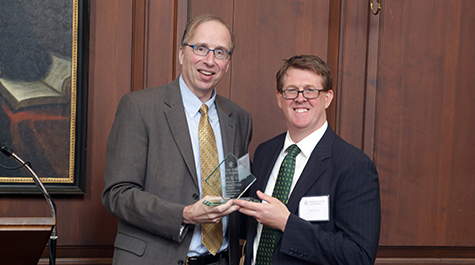Nate Green Presented with Annual St. George Tucker Award
On Friday, Aug. 26, Nate Green J.D. ’88 received the 2016-17 St. George Tucker Adjunct Professorship Award at a luncheon in the Great Hall of the Sir Christopher Wren Building.
The annual award recognizes an outstanding member of the Law School's adjunct faculty for service on behalf of students and is selected by nomination from the Law School Community.
Green is currently an adjunct professor in the Legal Practice Program and has taught at the Law School for 13 years. Since 2007, he has also served as Commonwealth’s Attorney for the City of Williamsburg and James City County.
At the luncheon, Dean Davison M. Douglas told William & Mary faculty, staff, and friends that Green had “excelled tremendously” at teaching in spite of his busy career as the area’s top prosecutor. He noted that Green’s enthusiasm and willingness to help his students was evidenced by student feedback.
Quoting one of Green’s former students, Douglas said, “Our class immediately liked and respected Professor Green, and this compelled us to put in extra effort.”
Originally from Iowa, Green earned his bachelor’s degree from George Mason University and his J.D. from William & Mary. During his law school days, Green spent a significant amount of time working as an extern for various Commonwealth's Attorney offices. After graduating, he worked as an Assistant Commonwealth’s Attorney in Fairfax County for three years. In 2001, he joined the Commonwealth's Attorney’s Office for Williamsburg and James City County, and became Commonwealth's Attorney just six years later.
Green’s days as a prosecutor are not always rosy. Douglas noted that Green never forgot that all of his courtroom successes were the result of someone else’s misfortune.
“It’s appropriate, it’s a consequence that has to happen, but it is hard to find sheer joy in it because it comes from a place of misery to begin with,” Douglas said, quoting Green’s reflections on his career.
However, Green later told the audience that sharing his knowledge and experiences with William & Mary Law students gave him “nothing but joy.”
“To see them want to gain from me, to want to listen, to want to learn what you know, it's fantastic, and it truly is an opportunity for us to give back in ways that we may not be able to do in our daily lives and in our careers,” he said.
Green concluded his remarks by saying that he hoped his legacy included not just his role as a prosecutor, but also as a teacher.
“If I helped just a few students learn some skills, if I helped a few students be able to go out and become creative, empathetic problem solvers, as they become lawyers, then I think I’ve done something special,” he said.
St. George Tucker (1752-1827), the second professor of law at William & Mary, succeeded George Wythe on the faculty and was a pioneer in legal education. He drafted a formal description of the requirements for a law degree at the College, which included an exacting schedule of qualifying examinations in subjects such as history and government. Tucker’s course material was published in 1803 as the first American edition of Blackstone’s Commentaries. For much of the early nineteenth century, this volume was considered the leading authority on American law. Tucker was also a distinguished judge, serving on both the state and federal benches for more than 30 years.
About William & Mary Law School
Thomas Jefferson founded William & Mary Law School in 1779 to train leaders for the new nation. Now in its third century, America's oldest law school continues its historic mission of educating citizen lawyers who are prepared both to lead and to serve.



